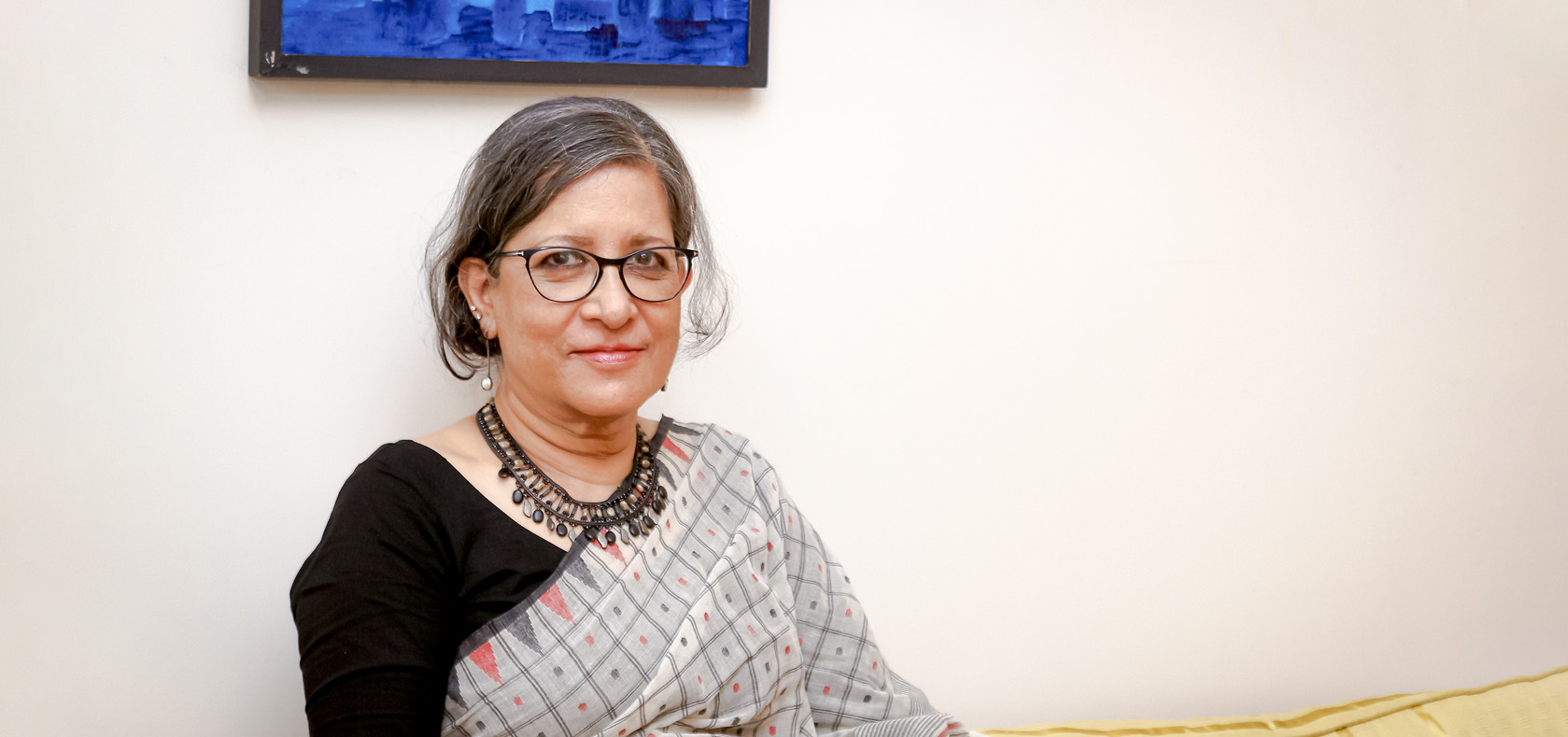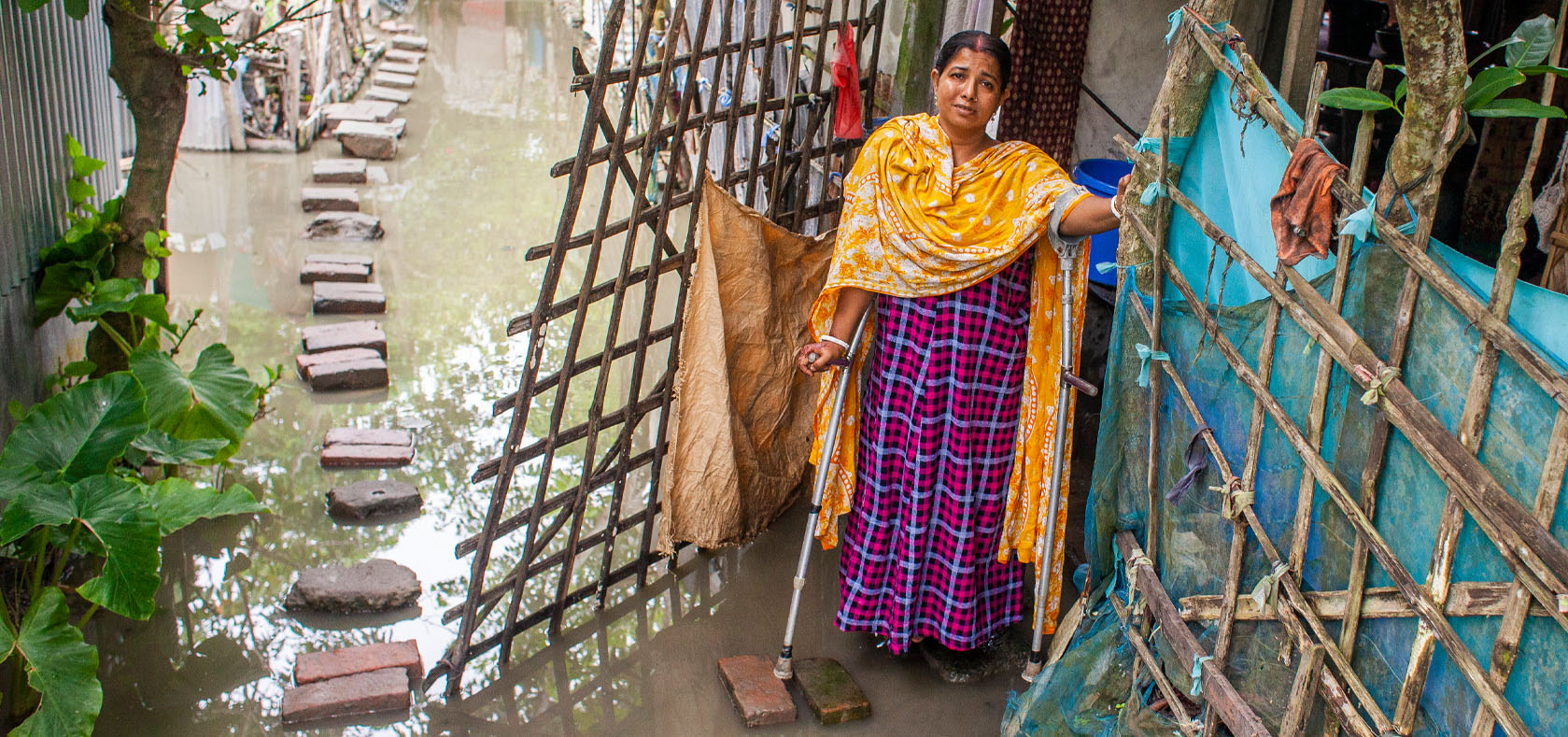Take five: “To truly address climate change we must work with people of all genders: not with charity, but with their full agency.”
Date:
Interviewed by Shararat Islam

Farah Kabir is the Country Director of ActionAid Bangladesh. Over close to three decades of vast experience in the field of development and research has made her renowned human rights figure and a CSO leader at home and abroad with an uncompromising voice against human-rights violation. She is a member of Advisory committee of Bangladesh’s NDA to the Green Climate Fund (GCF), a member of such Child Rights Committee National Human Rights Commission, Board member of UCEP. She is a member of the Global Board of the Global Network of Disaster Risk Reduction (GNDR), Board Member of Climate Action Network South Asia (CANSA) since 2019. steering committee member of ACIAR-Rupantar program of Australian Government, advisory committee member of Women’s Economic Empowerment (WEE).
What has been the role of civil society organizations (CSOs) in enabling gender-transformative actions on the ground in the areas of climate change and disaster risk reduction?
Civil society has played a crucial role in raising awareness, unpacking the concepts of climate change in both a scientific and non-scientific manner, and identifying its impacts on the community and coping mechanisms.
The first round of conversations was about adaptation. The role of CSOs has been to use the information from the ground and help conceptualize and develop women's leadership, find alternatives, and pilot successful models.
Lastly, we worked with political actors and government to improve our understanding of climate change, not just at the national level, also at the international level by participating in the Conference of Parties [of the United Nations Framework Convention on Climate Change].
What might be the CSOs’ contribution to the government’s existing plan to address climate change in a gender-responsive way for the country’s graduation from the ranks of Least Developed Countries?
Our role is to work in partnership with the Government of Bangladesh, volunteering to provide experiences from the ground, bring up pilot examples and share findings.
We need to work with institutions such as ministries, to ensure that their plans are gender responsive. We have a continued role to play in relevant official initiatives including the Bangladesh Climate Change Strategy and Action Plan, the National Adaptation Plan, the Delta Plan, and the Mujib Climate Prosperity Plan.
Right now, we are engaging with the government to take up the issue of loss and damage. This is not about economic loss only; it is also about the social loss. It is the loss of culture, confidence, loss of childhood for the girls when married off at an early age, and for the boys displaced and having to work to survive.
As we graduate from Least-Developed-Country status, we will have to redefine poverty. We cannot stay with the same mindset, index, and criterion. So, this is where CSOs will be able to contribute. We have a watchdog role to ensure that whatever is being proposed and planned is delivered and remains gender sensitive.
What are your views on the commitments made in the 26th COP outcome document? How do you see it advancing gender equality and women’s empowerment?
The COP26 outcome was not satisfactory. Because the developed countries were not willing to make that transition, to move from the fossil fuel and go for green transition and alternative energy.
On a positive note, there has been a new momentum around the world to put gender at the forefront of climate action. The COP26 also focused on gender in science and innovation. However, these CoP pledges and commitment will come to fruition with serious investment and clear action plans. This will enable the decision makers nationally and at internationally measure how gender equality improves science, technology, and innovation for climate action.
We need to shake our political actors, decision makers, private sector, and entrepreneurs to break the silos nationally and in other parts of the world. Our government has produced the Mujib Prosperity Plan, and the hundred-year Delta Plan. But the vision will only remain in paper unless is it translated into action with clear plans, finance, and targets.
How can CSO voices be included in the Government’s national climate change plans and policies, including the Mujib Climate Prosperity Plan?
INGO/CSOs such as ActionAid has a demonstrated commitment, and history of working with the grassroots around adaptation and partnered with them for climate justice. Then there is International Centre for Climate Change and Development developing the research segment as well as policy for climate change. Now there is a second generation of CSOs who have the advantage building on the learning of AAB and ICCCAD and pursue programmatic interventions as well as join in the advocacy initiatives. There are funds nationally as well as small amount from GCF that they can apply for and pilot projects. Presently private sector initiatives for developing green infrastructure and other initiatives with the intent of transition to a greener mode is taking place.
The CSOs must understand the social, economic aspects of climate change and, if possible, work closely with the science fraternity and researchers to develop their own understanding, which will enable them to come up with alternatives.

Bangladesh has demonstrated strong leadership in acknowledging the risks posed by climate change by making adaptation and disaster response central pillars of its national development framework. Considering the agreed conclusions at the 66th CSW, how can Bangladesh advance their implementation to bring a sustainable change in the lives of women and girls?
Addressing the gender dimensions of climate change and its responses entails collaborating with women, men, girls, boys, third gender and other marginalized people. The intention of such engagement must be to recognise their agency, and support participation moving away from the victim’s mentality which leads to charity approach when dealing with these members of the community.
We need to promote gender-responsive international climate negotiations. So far, the negotiations are not participatory. Unfortunately, women remain in the outer circles when it comes to decision making therefore their voices and perspective remain missing or barely incorporated. It is so difficult to go to [the events of] UNFCCC, such as COPs, CSW [Commission on the Status of Women], UN GA high level political forum etc. The organizers do not make it easy for young people, women, and girls to participate in the CoPs. Thus, targeted efforts by national governments and UN will be critical to change existing practices of the UNFCCC, democratise it and ensure inclusivity. The CSOs must continue to bring women’s voice to the decision-making spaces until this change is happens
Localization needs to happen through funding small initiatives, to women-headed and youth organizations. We need to work on the national level, influence national political actors, make these demands from home, and then continue making our demands at the global level. Bangladesh is a champion in climate adaptation and advocacy therefore it is imperative for Bangladesh to lead the way for gender and climate justice!